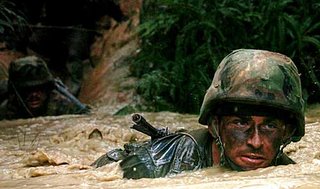


|

|
|
|
Home |
The Mil & Aero Blog
 Posted by John Keller Here's a potential new spin on Hillary Clinton and her red-phone television commercials. If there's a global emergency in the offing, it might not be in Central Asia, where everyone expects it to be. It could be right here in our own hemisphere. War might be coming to South America. Venezuela President Hugo Chavez has ordered 10 tank battalions to his border with Columbia, and put his air force under emergency standby, according to a story in the Daily Mail of London entitled U.S. could intervene as Chavez prepares for war on Columbia. Venezuela also has closed the Columbian embassy in its capital of Caracas. Chavez, it seems, objects to Columbia's sending soldiers into neighboring Ecuador to fight guerilla soldiers hostile to the Columbian government. Chavez, moreover, is telling Columbia not to chase anti-Columbia guerrillas into Venezuela, warning that such an act would be "cause for war." Let's remember that the Venezuela-Columbia border is just a thousand miles south of Miami, and less than 500 miles from the strategically important Panama Canal. Could the U.S. stand by if Columbia and Venezuela were to go to war? I think the answer is, probably not -- especially if such a war were to escalate quickly. Columbia borders on Panama, and is only about 150 miles from the Panama Canal at its closest point. The Canal is one of the most strategically important places in the world. It is key to U.S. capability to move naval forces quickly between the Atlantic and Pacific oceans. There is little doubt that the United States would intervene quickly in any conflict if U.S. access to the Canal were threatened. Chances of U.S. intervention lessen if the Canal is not part of the equation, yet Venezuela's oil reserves, which many consider to be a strategic asset, undoubtedly will play a role in U.S. decision making. That's just what we would need -- an armed conflict in the tropical jungles of South America, just as the U.S. seems ready to start drawing down its military commitment in Iraq. It's interesting to glance at the world map and notice that northern Columbia and Venezuela are roughly at the same latitude as Vietnam. Maybe this speculation is all for nothing; I hope it is. U.S. officials point out that Hugo Chavez is notorious for making wild threats. Perhaps he has no intention of going to war. If he does, though, it won't be pretty. Now let's add another twist to the mix. Panama Canal operations are managed by a company with close ties to the Chinese government. China is an ally of Venezuela, and China is in desperate need of oil sources to maintain its rate of economic growth. Is it possible that an escalating war between Columbia and Venezuela might bring the U.S. and China into some form of conflict? I think I'd better quick speculating right here. The accompanying photo is of U.S. Navy Petty Officer 3rd Class Jordan Mann, a Seabee assigned to Naval Mobile Construction Battalion 40, low-crawls through a pond during the endurance course at the Jungle Warfare Training Center at Camp Gonslaves, Okinawa, Japan. U.S. Navy photo by Petty Officer 3rd Class John P. Curtis. << Home |
Welcome to the lighter side of Military & Aerospace Electronics. This is where our staff recount tales of the strange, the weird, and the otherwise offbeat. We could put news here, but we have the rest of our Website for that. Enjoy our scribblings, and feel free to add your own opinions. You might also get to know us in the process. Proceed at your own risk. 
John Keller is editor-in-chief of Military & Aerospace Electronics magazine, which provides extensive coverage and analysis of enabling electronic and optoelectronic technologies in military, space, and commercial aviation applications. A member of the Military & Aerospace Electronics staff since the magazine's founding in 1989, Mr. Keller took over as chief editor in 1995.  Courtney E. Howard is senior editor of Military & Aerospace Electronics magazine. She is responsible for writing news stories and feature articles for the print publication, as well as composing daily news for the magazine's Website and assembling the weekly electronic newsletter. Her features have appeared in such high-tech trade publications as Military & Aerospace Electronics, Computer Graphics World, Electronic Publishing, Small Times, and The Audio Amateur.
Courtney E. Howard is senior editor of Military & Aerospace Electronics magazine. She is responsible for writing news stories and feature articles for the print publication, as well as composing daily news for the magazine's Website and assembling the weekly electronic newsletter. Her features have appeared in such high-tech trade publications as Military & Aerospace Electronics, Computer Graphics World, Electronic Publishing, Small Times, and The Audio Amateur.
 John McHale is executive editor of Military & Aerospace Electronics magazine, where he has been covering the defense Industry for more than dozen years. During that time he also led PennWell's launches of magazines and shows on homeland security and a defense publication and website in Europe. Mr. McHale has served as chairman of the Military & Aerospace Electronics Forum and its Advisory Council since 2004. He lives in Boston with his golf clubs.
John McHale is executive editor of Military & Aerospace Electronics magazine, where he has been covering the defense Industry for more than dozen years. During that time he also led PennWell's launches of magazines and shows on homeland security and a defense publication and website in Europe. Mr. McHale has served as chairman of the Military & Aerospace Electronics Forum and its Advisory Council since 2004. He lives in Boston with his golf clubs.
Previous Posts
Archives
|
|||||
Internet gems
THE MAE WEBSITE AUTHORS ARE SOLELY RESPONSIBLE FOR THE CONTENT AND ACCURACY OF THEIR BLOGS, INCLUDING ANY OPINIONS THEY EXPRESS, AND PENNWELL IS NOT RESPONSIBLE FOR AND HEREBY DISCLAIMS ANY AND ALL LIABILITY FOR THE CONTENT, ITS ACCURACY, AND OPINIONS THAT MAY BE CONTAINED HEREIN. THE CONTENT ON THE MAE WEBSITE MAY BE DATED AND PENNWELL IS UNDER NO OBLIGATION TO PROVIDE UPDATES TO THE INFORMATION INCLUDED HEREIN.
|
||||||
|
|
Home | About Us | Contact Us | Corporate Website | Privacy Policy | Courage and Valor Foundation | Site Map
Also Visit: Laser Focus World | Vision Systems Design | Industrial Laser Solutions Copyright © 2007: PennWell Corporation, Tulsa, OK; All Rights Reserved. | Terms & Conditions | Webmaster |
Tuesday, March 4, 2008 10:37:00 AM EST
Wednesday, March 5, 2008 2:05:00 PM EST